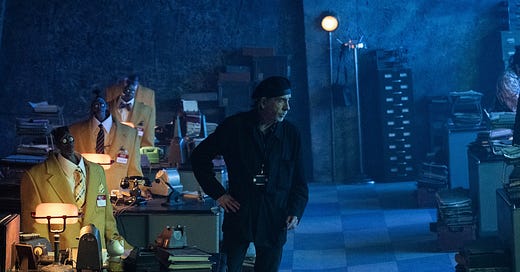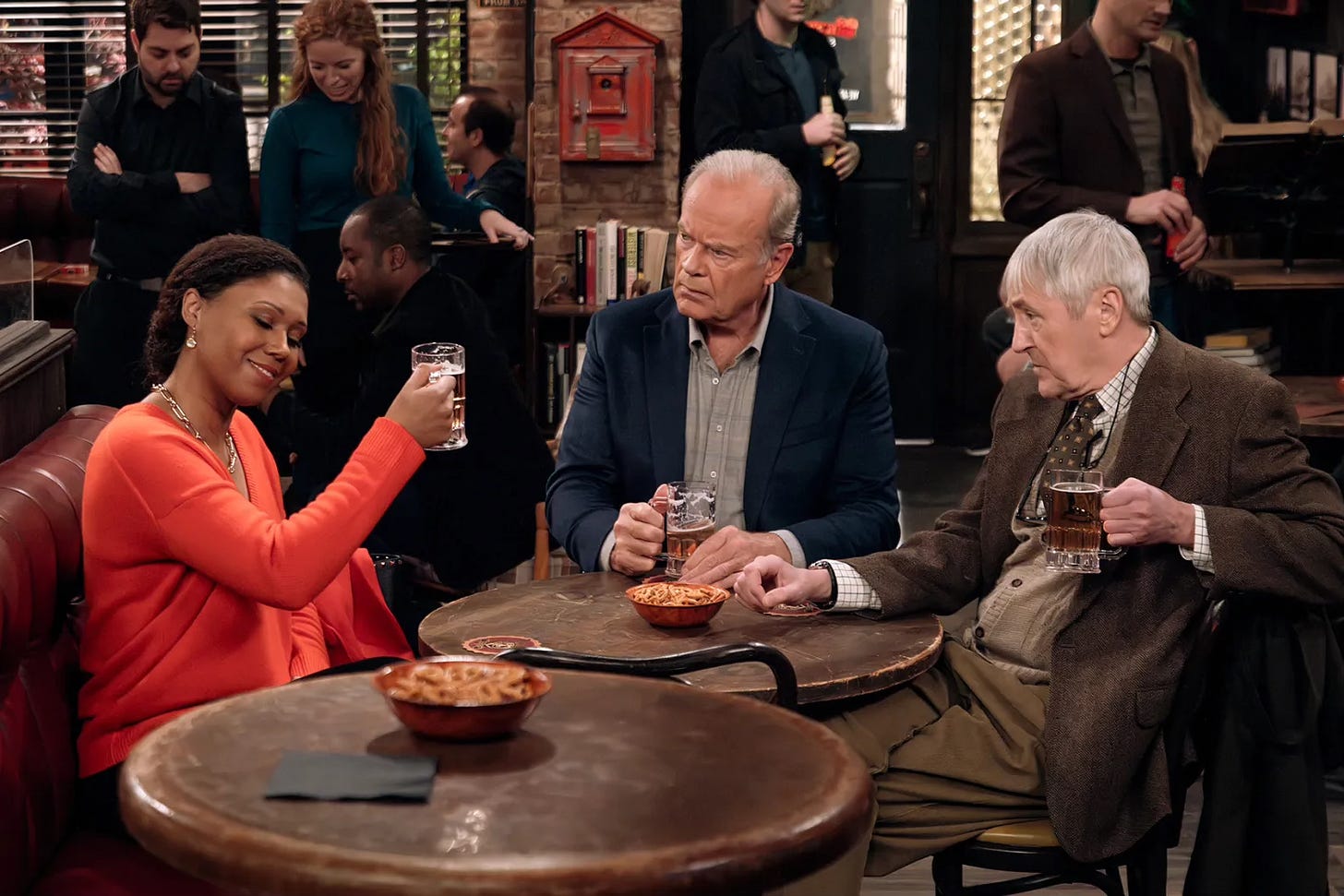
'Beetlejuice Beetlejuice' and the End of Tim Burton
Burton returns to one of his most distinctive characters and has nothing new to say.
When Tim Burton came on to the scene in the mid-80s with the brilliant Pee-Wee’s Big Adventure, he followed it up with Beetlejuice, a chaotic blast that defined the filmmaker’s outsider stance. The premise runs counter to a typical haunting story. In the case of the 1988 movie, it’s the humans who are bothering the ghosts. Burton’s big love of weirdo outsiders (which is how he views himself) managed to translate to box office hits whether it was wearing the superhero costume of Batman, his original creation Edward Scissorhands, or the biopic Ed Wood. For an artist who saw his sensibilities outside of the mainstream, the mainstream consistently accepted what he was doing, and no one else could even seek to replicate his blend of goth and classic horror visuals.
Burton never seemed to ponder the question, “What happens when the outsider becomes part of the Hollywood establishment?” Instead, he carved out a niche so deep he never found a way to emerge out of it, nor did he seem to have much interest in doing so. His career arguably peaked at Big Fish, a movie that still bore his signature style while also moving in a more mature direction with its themes of fathers, sons, and the way storytelling bonds people together across a lifetime. But from there, Burton has retreated into something more in line with predictability at best and self-parody at worst.
While Burton is far from the first director to drop off as he got older, he remains a fascinating case study because his brand was, “Look how imaginative I am!” The whole thesis of Edward Scissorhands is that people will embrace creativity as long as they feel like it can be tamed; once it feels dangerous or difficult, they’ll reject it to return to conformity. I don’t think the Burton of the late 1980s expected that the conformity he critiqued, whether it was the suburbanites of Edward Scissorhands or the yuppies of Beetlejuice, would lead to such staid predictability in his own work, and yet here we are.
Beetlejuice Beetlejuice may show Burton having fun, but it’s in the same way he’s having fun with his stop-motion remake of his live-action short, Frankenweenie—don’t push me out of my comfort zone, and I won’t push you out of yours. Whereas the original movie is daring and weird, the sequel constantly has the air of a resigned shrug. It’s good enough because it’s doing Beetlejuice things. It’s a project that’s been in development hell forever, and Kevin Smith summed up the notion of a sequel perfectly when he recalled being asked to do a rewrite on Beetlejuice Goes Hawaiian: “Didn’t we say all we needed to say with the first Beetlejuice? Must we go tropical?”
One would think that Burton may have some new perspective on a 35-year-old character and movie, but Beetlejuice Beetlejuice answers with a resounding, “Nope!” The movie is fine, but it’s clearly a bunch of old scripts mashed together where Burton and star Michael Keaton were satisfied enough and had time in their schedules to do it. And hey, it’s tracking to be a big hit, so maybe that’s good enough. But with 35 extra years of experience under his belt, Burton has oddly become less personal in his work. There is a Tim Burton style, it goes up on the screen, and that’s it. People still seem to like it (his Netflix series, Wednesday, a spin-off of The Addams Family, was a big hit for the streamer), and he’s content to give the people what they want.
The lesson of Burton’s career (and while he’ll continue to make movies and TV, Beetlejuice Beetlejuice is pretty definitive that he has nothing left in the tank creatively nor any desire to dig deeper) is that unless you continue to push yourself, you will eventually become commoditized by the forces you once criticized. While this has been apparent with Burton for well over a decade, Beetlejuice Beetlejuice shows that Burton today is a distant echo who seems unable to even understand his younger self.
In 1988’s Beetlejuice, the adults get possessed into doing a rendition of Harry Belafonte’s “Banana Boat (Day-O).” In the sequel, a children’s choir now sings the song at a funeral for no reason other than the audience recalling the song from the first movie. If Burton was so eager to remind audiences of his past glories, he could go point out merchandise at the nearest Hot Topic.
Recommendations
When I read political coverage in The New York Times, I feel like I’m taking crazy pills. For example, here’s a recent article describing differences in housing policies between Harris and Trump:
Ms. Harris is promising a cocktail of tax cuts meant to spur home construction — which several economists said could help create supply. But she is also floating a $25,000 benefit to help first-time buyers break into the market, which many economists worry could boost demand too much, pushing home prices even higher. And both sets of policies would need to pass in Congress, which would influence their design and feasibility.
Mr. Trump’s plan is garnering even more doubt. He pledges to deport undocumented immigrants, which could cut back temporarily on housing demand but would also most likely cut into the construction workforce and eventually limit new housing supply. His other ideas include lowering interest rates, something that he has no direct control over and that is poised to happen anyway.
This is…deranged? One of these is general governance—writing bills, negotiating compromises, etc, and the other is a mass deportation plan on a scale hitherto unseen in U.S. history, and to take them both seriously as “economists have doubts,” is not journalism. It would be like saying, “Harris has a plan to increase SNAP benefits for families; Trump wants to harvest the moon, which he believes is made of green cheese.”
Thankfully, Margaret Sullivan also sees the imbalance here, and since she’s been in the trenches, she knows what to look for and the larger issues at play:
In 4K deals, it’s almost spooky season! The 4Ks of The Thing and Poltergeist are both on sale, so you should add them to your collection.
Note: I earn a small percentage of sales made through my Amazon Associates links.
What I’m Watching
We have finally finished our rewatch of the original Frasier and finally gave the new Frasier a shot. Original Frasier remains one of the best sitcoms of all time. New Frasier takes a couple of episodes to find its footing, but once you hit episode 3 or 4, it finds its groove! While it may not reach the incredible heights of the original series, it’s still an above-average sitcom. The most infuriating thing about it is that there are only ten episodes. I do not understand streaming economics because it makes no sense to me why an expensive drama series and a regular multi-camera sitcom are capped at ten episodes on a streamer. I understand why you can’t put Frasier on network television because no one’s watching that anymore unless it’s for sports, but I feel like the studio is being a bit cheap if they can’t shell out for 22 episodes of a normal sitcom.
Also, not for nothing, but The Office and Friends didn’t become huge streaming hits from wimpy ten-episode seasons. If your metric is keeping people on your platform, you may have to actually build an audience with bigger seasons rather than throwing a billion new shows at viewers and hoping for the best.
What I’m Reading
I have a little over 100 pages left in The Power Broker. The end is in sight. After I’m done, no more tomes in 2024.
In other reads:
The Bookmaker: Nate Silver and the addiction to prediction by Leif Weatherby and Ben Recht [The Point Magazine] - Nate Silver has a new book out, and it’s apparently pretty bad. For those who don’t know, Silver rose to prominence in the 2000s by using statistical analysis to correctly predict electoral outcomes. For a moment, Silver looked like his way may usher out the pundits and place the reliance on polling data. Then, like with so many others (myself included), 2016 broke his brain a little bit when Trump won. Since then, Silver has basically been arguing that his approach is meant to determine odds favorable to gamblers. This is great if you’re playing poker; it’s less great if you want to apply it to society, which is what Silver tries to do. Reading Weatherby and Recht’s review, what struck me is the “heads I win, tails you lose” rhetoric from Silver. If he correctly predicts electoral outcomes, he simply, to paraphrase his first book’s title, separated the signal from the noise. But, if he’s wrong, then hey, he was just providing odds for gambling. Also, to use gambling as an outlook on life itself reminds me of what Jon Stewart told Chris Matthews about his book, Life’s a Campaign: “This reads like a recipe for sadness.”
Why the Media Won’t Report the Truth About Trump by James Risen [The Intercept] - I partly agree with Risen’s argument here that the media has adopted horse-race coverage because it’s A) easy; B) arguably nonpartisan; and C) meets the short-attention-span demands of cable news and social media. And yet, I still don’t feel like it’s telling the whole story. It doesn’t explain why the media feels like it needs to grill Harris on every sentence she’s ever spoken while Trump can say this to a room full of people and the media shrugs:
“Think of it, your kid goes to school and comes home a few days later with an operation. The school decides what’s going to happen with your child. And many of these childs, 15 years later say, what the hell happened? Who did this to me? They say, who did this to me? It’s incredible.”
Yes, that is incredible. That is Ralph Wiggum telling his parents about his day at school levels of incredible. I too am amazed by things that never happened.
My argument is that major political media wants to maintain the appearance of being “objective” but because Trump is so deranged, if you quote him directly, it looks unfair. This has led to the press “sane-washing” Trump. To return to Risen’s horse-race argument, the way you keep the race entertaining is by downplaying Trump’s flaws and playing up anything Harris does wrong.
What I’m Playing
I’m about halfway through The Last of Us Part II Remastered. It’s a good game although I have a similar complaint about it as I did the first one, which is that I personally could do without the combat stuff; let me just search for stuff in the The World Without Us wasteland. It’s also so dramatically heavy that I went ahead and pre-ordered Astro Bot because I know I’m going to need the uplift. Look at that little guy go!








